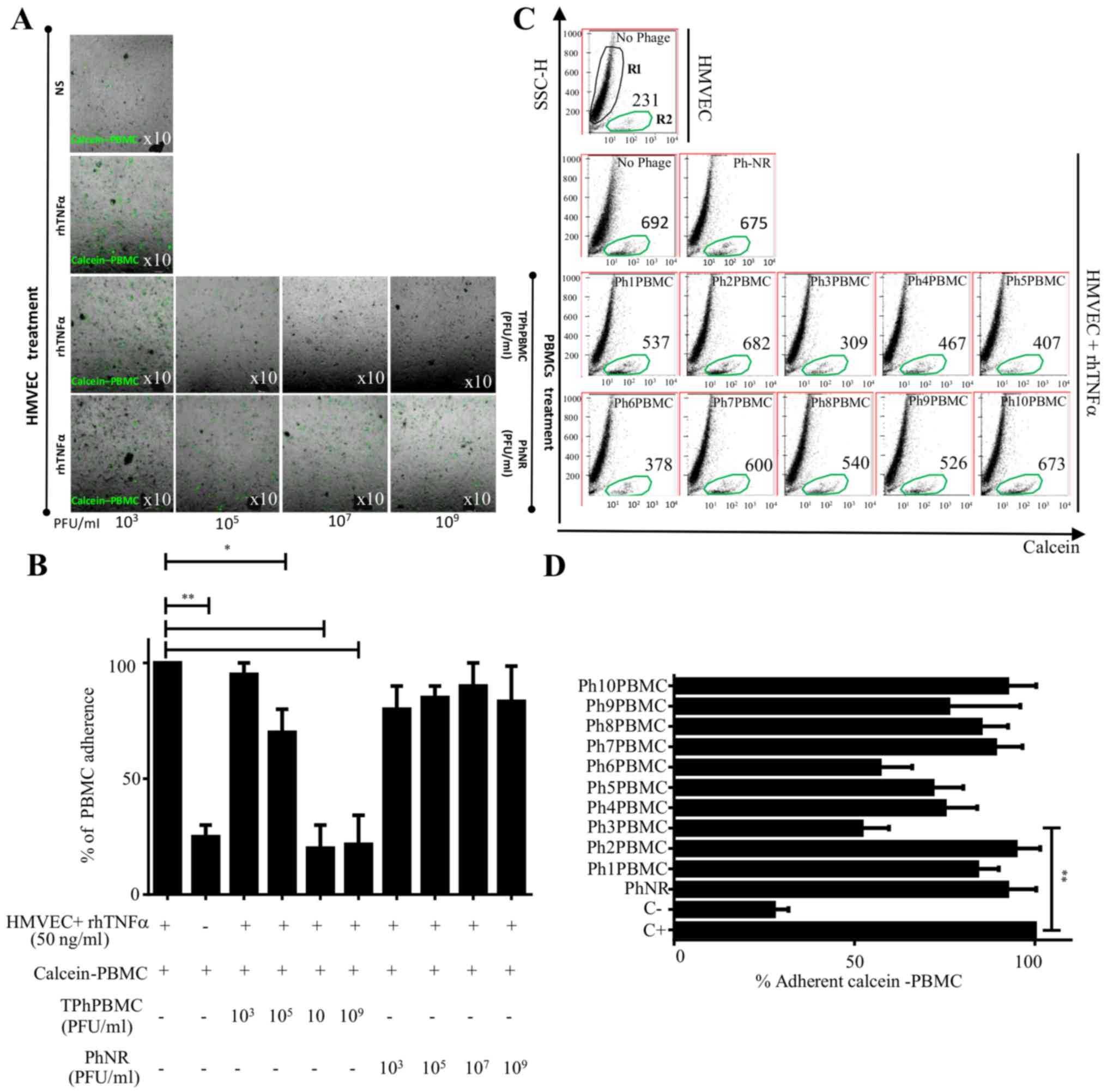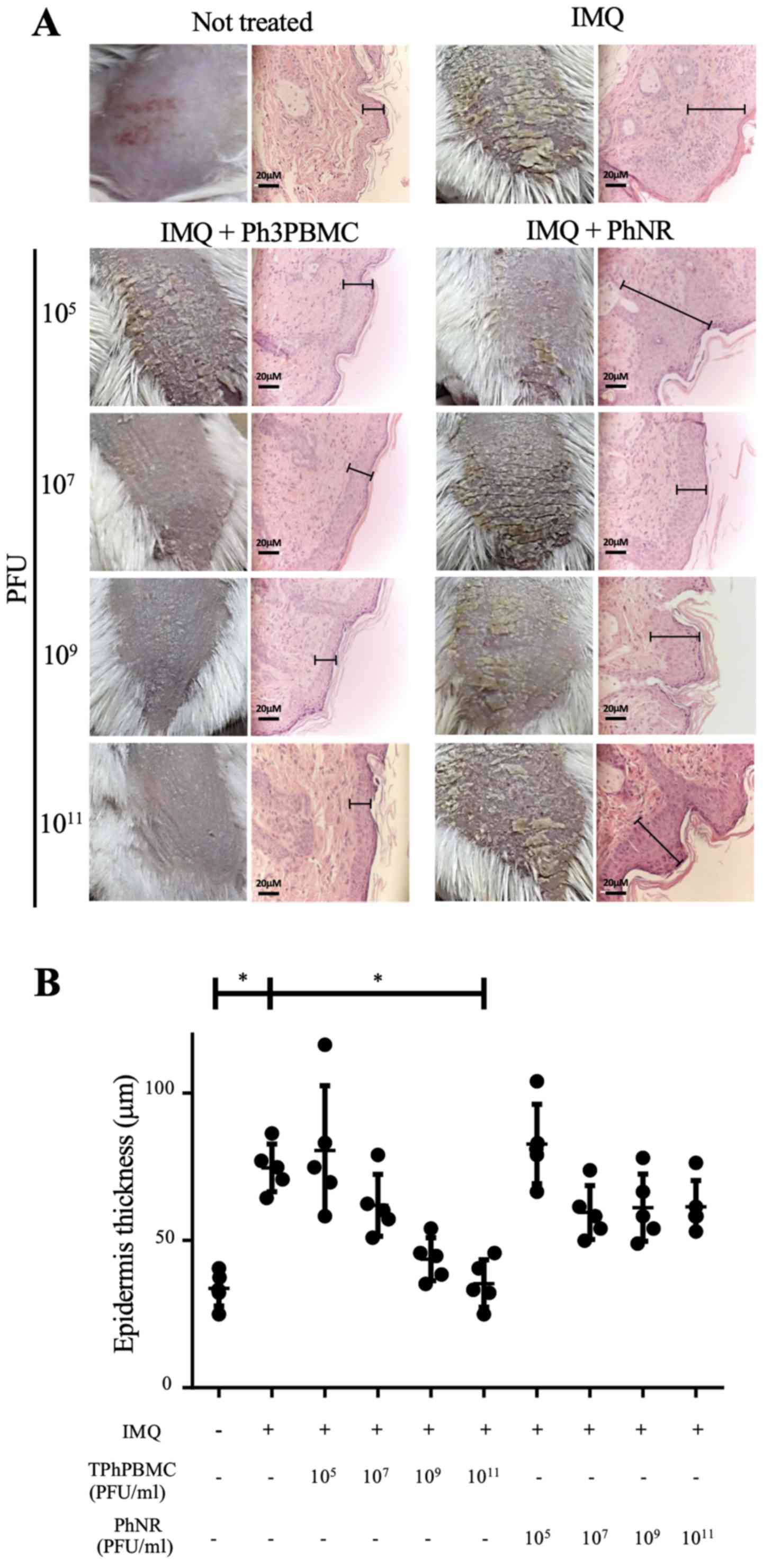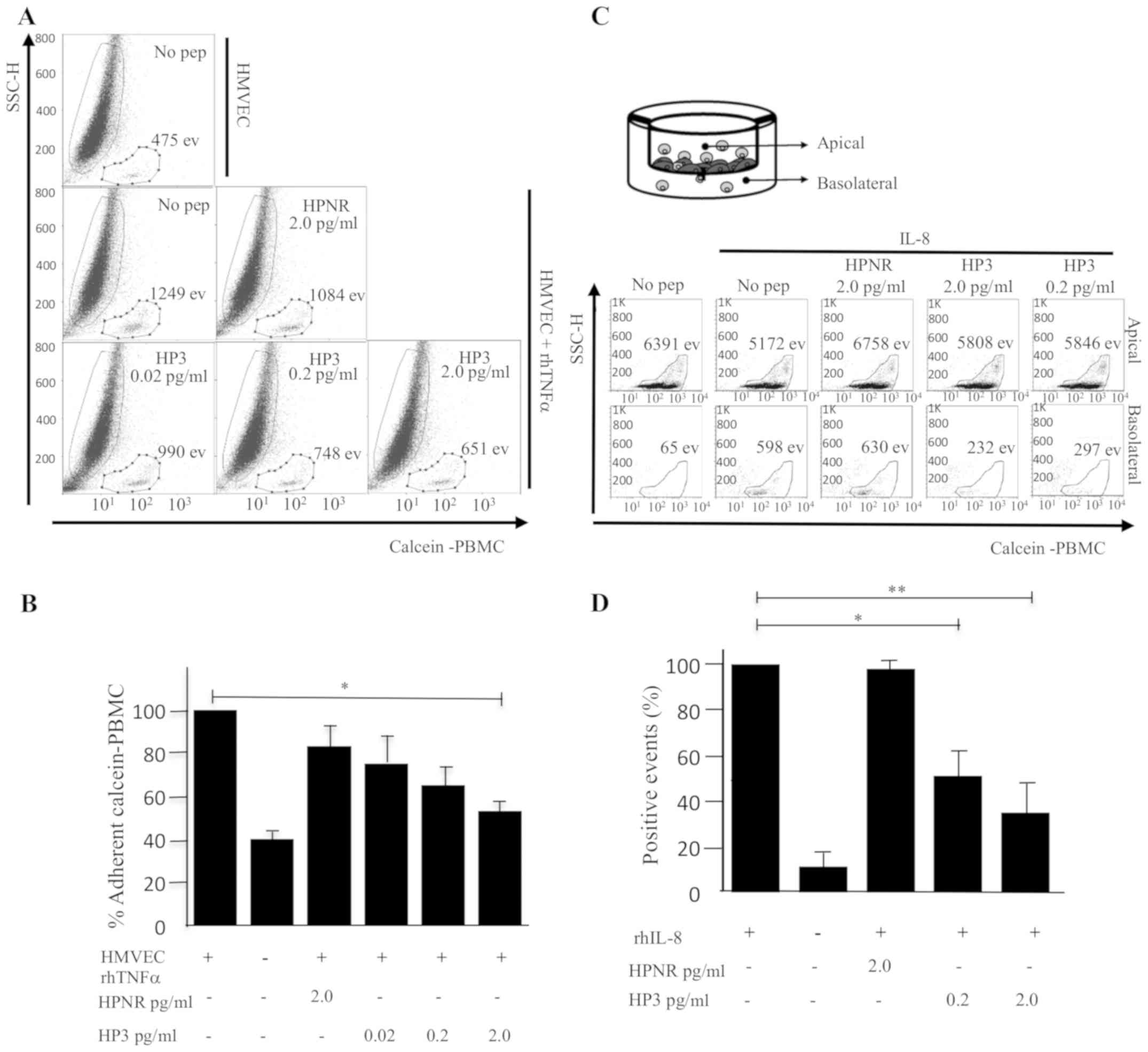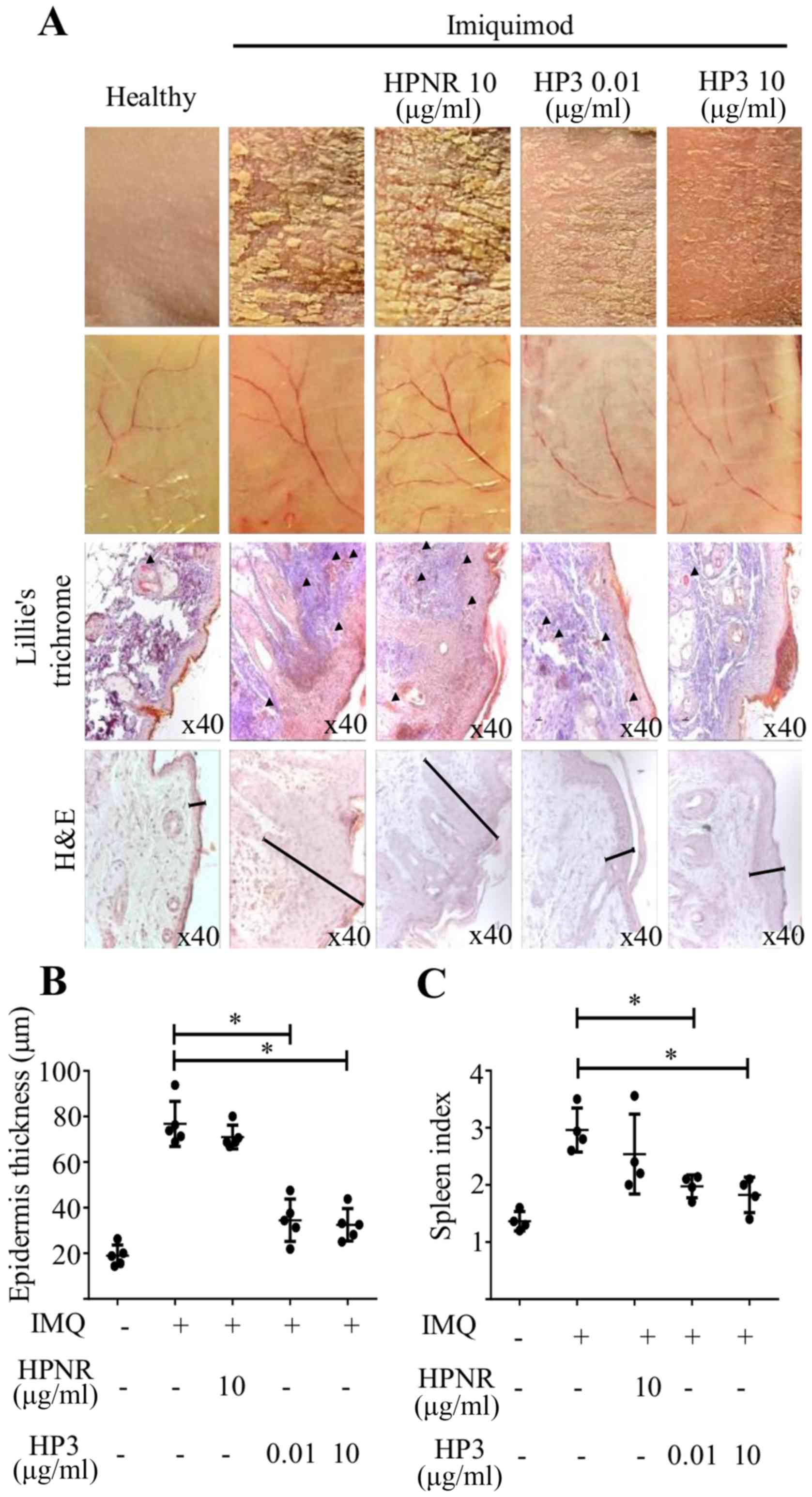|
1
|
Hickey MJ, Reinhardt PH, Ostrovsky L,
Jones WM, Jutila MA, Payne D, Elliott J and Kubes P: Tumor necrosis
factor-alpha induces leukocyte recruitment by different mechanisms
in vivo and in vitro. J Immunol. 158:3391–3400. 1997.PubMed/NCBI
|
|
2
|
Li Q, Chandran V, Tsoi L, O'Rielly D, Nair
RP, Gladman D, Elder JT and Rahman P: Quantifying differences in
heritability among psoriatic arthritis (PsA), cutaneous psoriasis
(PsC) and psoriasis vulgaris (PsV). Sci Rep. 10:49252020.
View Article : Google Scholar : PubMed/NCBI
|
|
3
|
Beurskens T, Chang A, van Erp PE and van
de Kerkhof PC: Epidermal proliferation and accumulation of
polymorphonuclear leukocytes in the psoriatic lesion.
Dermatologica. 178:67–72. 1989. View Article : Google Scholar : PubMed/NCBI
|
|
4
|
Schlaak JF, Buslau M, Jochum W, Hermann E,
Girndt M, Gallati H, Meyer zum Büschenfelde KH and Fleischer B: T
cells involved in psoriasis vulgaris belong to the Th1 subset. J
Invest Dermatol. 102:145–149. 1994. View Article : Google Scholar : PubMed/NCBI
|
|
5
|
Nestle FO, Di Meglio P, Qin JZ and
Nickoloff BJ: Skin immune sentinels in health and disease. Nat Rev
Immunol. 9:679–691. 2009. View
Article : Google Scholar : PubMed/NCBI
|
|
6
|
Singh K, Gatzka M, Peters T, Borkner L,
Hainzl A, Wang H, Sindrilaru A and Scharffetter-Kochanek K: Reduced
CD18 levels drive regulatory T cell conversion into Th17 cells in
the CD18hypo PL/J mouse model of psoriasis. J Immunol.
190:2544–2553. 2013. View Article : Google Scholar : PubMed/NCBI
|
|
7
|
He Q, Chen HX, Li W, Wu Y, Chen SJ, Yue Q,
Xiao M and Li JW: IL-36 cytokine expression and its relationship
with p38 MAPK and NF-κB pathways in psoriasis vulgaris skin
lesions. J Huazhong Univ Sci Technolog Med Sci. 33:594–599. 2013.
View Article : Google Scholar : PubMed/NCBI
|
|
8
|
Nedoszytko B, Sokołowska-Wojdyło M,
Ruckemann- Dziurdzińska K, Roszkiewicz J and Nowicki RJ: Chemokines
and cytokines network in the pathogenesis of the inflammatory skin
diseases: Atopic dermatitis, psoriasis and skin mastocytosis.
Postepy Dermatol Alergol. 31:84–91. 2014. View Article : Google Scholar : PubMed/NCBI
|
|
9
|
Alexander H and Nestle FO: Pathogenesis
and immunotherapy in cutaneous psoriasis. what can rheumatologists
learn? Curr Opin Rheumatol. 29:71–78. 2017. View Article : Google Scholar : PubMed/NCBI
|
|
10
|
Guenther L, Van De Kerkhof PC, Snellman E,
Kragballe K, Chu AC, Tegner E, Garcia-Diez A and Springborg J:
Efficacy and safety of a new combination of calcipotriol and
betamethasone dipropionate (once or twice daily) compared to
calcipotriol (twice daily) in the treatment of psoriasis vulgaris:
A randomized, double-blind, vehicle-controlled clinical trial. Br J
Dermatol. 147:316–323. 2002. View Article : Google Scholar : PubMed/NCBI
|
|
11
|
Shah RA, Nwannunu CE, Limmer AL, Patel RR,
Mui UN and Tyring SK: Brief update on dermatologic uses of
methotrexate. Skin Therapy Lett. 24:5–8. 2019.
|
|
12
|
Krueger G and Callis K: Potential of tumor
necrosis factor inhibitors in psoriasis and psoriatic arthritis.
Arch Dermatol. 140:218–225. 2004. View Article : Google Scholar : PubMed/NCBI
|
|
13
|
Ryan C, Leonardi CL, Krueger JG, Kimball
AB, Strober BE, Gordon KB, Langley RG, de Lemos JA, Daoud Y,
Blankenship D, et al: Association between biologic therapies for
chronic plaque psoriasis and cardiovascular events: A meta-analysis
of randomized controlled trials. JAMA. 306:864–871. 2011.
View Article : Google Scholar : PubMed/NCBI
|
|
14
|
Tzellos T, Kyrgidis A, Trigoni A and
Zouboulis CC: Point: Major adverse cardiovascular events and
anti-IL 12/23 agents. J Am Acad Dermatol. 70:380–381. 2014.
View Article : Google Scholar : PubMed/NCBI
|
|
15
|
Thaçi D, Blauvelt A, Reich K, Tsai TF,
Vanaclocha F, Kingo K, Ziv M, Pinter A, Hugot S, You R and
Milutinovic M: Secukinumab is superior to ustekinumab in clearing
skin of subjects with moderate to severe plaque psoriasis: CLEAR, a
randomized controlled trial. J Am Acad Dermatol. 73:400–409. 2015.
View Article : Google Scholar : PubMed/NCBI
|
|
16
|
Gordon KB, Blauvelt A, Papp KA, Langley
RG, Luger T, Ohtsuki M, Reich K, Amato D, Ball SG, Braun DK, et al:
Phase 3 trials of ixekizumab in moderate-to-severe plaque
psoriasis. N Engl J Med. 375:345–356. 2016. View Article : Google Scholar : PubMed/NCBI
|
|
17
|
Su Z, Paulsboe S, Wetter J, Salte K,
Kannan A, Mathew S, Horowitz A, Gerstein C, Namovic M, Todorović V,
et al: IL-36 receptor antagonistic antibodies inhibit inflammatory
responses in preclinical models of psoriasiform dermatitis. Exp
Dermatol. 28:113–120. 2019. View Article : Google Scholar : PubMed/NCBI
|
|
18
|
Rossi B and Constantin G: Anti-selectin
therapy for the treatment of inflammatory diseases. Inflamm Allergy
Drug Targets. 7:85–93. 2008. View Article : Google Scholar : PubMed/NCBI
|
|
19
|
Rychly J and Nebe B: Therapeutic
strategies in autoimmune diseases by interfering with leukocyte
endothelium interaction. Curr Pharm Des. 12:3799–3806. 2006.
View Article : Google Scholar : PubMed/NCBI
|
|
20
|
Radi ZA, Kehrli ME Jr and Ackermann MR:
Cell adhesion molecules, leukocyte trafficking, and strategies to
reduce leukocyte infiltration. J Vet Intern Med. 15:516–529. 2001.
View Article : Google Scholar : PubMed/NCBI
|
|
21
|
Koo JY, Bagel J, Sweetser MT and Ticho BS:
Alefacept in combination with ultraviolet B phototherapy for the
treatment of chronic plaque psoriasis: Results from an open-label,
multicenter study. J Drugs Dermatol. 5:623–628. 2006.PubMed/NCBI
|
|
22
|
van der Fits L, Mourits S, Voerman JS,
Kant M, Boon L, Laman JD, Cornelissen F, Mus AM, Florencia E, Prens
EP and Lubberts E: Imiquimod-induced psoriasis-like skin
inflammation in mice is mediated via the IL-23/IL-17 axis. J
Immunol. 182:5836–5845. 2009. View Article : Google Scholar : PubMed/NCBI
|
|
23
|
Strober BE, Bissonnette R, Fiorentino D,
Kimball AB, Naldi L, Shear NH, Goyal K, Fakharzadeh S, Calabro S,
Langholff W, et al: Comparative effectiveness of biologic agents
for the treatment of psoriasis in a real-world setting: Results
from a large, prospective, observational study [Psoriasis
Longitudinal Assessment and Registry (PSOLAR)]. J Am Acad Dermatol.
74:851–861.e4. 2016. View Article : Google Scholar : PubMed/NCBI
|
|
24
|
Branisteanu DE, Voicu CM, Cretu A,
Dimitriu A, Luca MC and Salavastru CM: Adverse reactions of
biological therapy for psoriasis. Rev Med Chir Soc Med Nat Iasi.
119:38–44. 2015.PubMed/NCBI
|
|
25
|
Lau JL and Dunn MK: Therapeutic peptides:
Historical perspectives, current development trends, and future
directions. Bioorg Med Chem. 26:2700–2707. 2018. View Article : Google Scholar : PubMed/NCBI
|


















